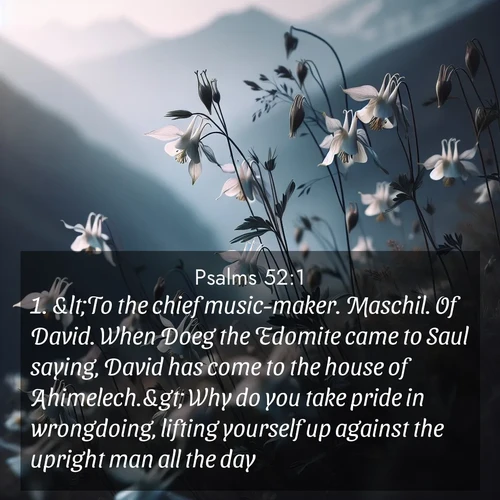Create Basic English Wallpapers: Images for Psalms Chapter 52 Verses
Psalms 52:1. <To the chief music-maker. Maschil. Of David. When Doeg the Edomite came to Saul saying, David has come to the house of Ahimelech.> Why do you take pride in wrongdoing, lifting yourself up against the upright man all the day?
Read the verse in its context:
Basic English Psalms 52
Psalms 52:2. Purposing destruction, using deceit; your tongue is like a sharp blade.
Read the verse in its context:
Basic English Psalms 52
Psalms 52:3. You have more love for evil than for good, for deceit than for works of righteousness. (Selah.)
Read the verse in its context:
Basic English Psalms 52
Psalms 52:4. Destruction is in all your words, O false tongue.
Read the verse in its context:
Basic English Psalms 52
Psalms 52:5. But God will put an end to you for ever; driving you out from your tent, uprooting you from the land of the living. (Selah.)
Read the verse in its context:
Basic English Psalms 52
Psalms 52:6. The upright will see it with fear, and will say, laughing at you:
Read the verse in its context:
Basic English Psalms 52
Psalms 52:7. See, this is the man who did not make God his strength, but had faith in his goods and his property, and made himself strong in his wealth.
Read the verse in its context:
Basic English Psalms 52
Psalms 52:8. But I am like a branching olive-tree in the house of God; I have put my faith in his mercy for ever and ever.
Read the verse in its context:
Basic English Psalms 52
Psalms 52:9. I will give you praise without end for what you have done; I will give honour to your name before your saints, for it is good.
Read the verse in its context:
Basic English Psalms 52
The images of Bible verses are created starting from the verses in the Basic English Bible and are made vailable freely for download and use. A link to our website is appreciated to let others know about this free image library. The Bible in Basic English was created in the 1940s by S.H. Hooke, an English language scholar. He wanted to make the Bible accessible to people with limited English, those learning it as a second language, and those with low literacy. To achieve this, he used a simplified vocabulary of just 850 common words, with minimal grammar. This made the text easier to understand, though some argue it loses some of the poetry and nuance of the original. Despite this, it has been praised for its clarity and continues to be used today by many, particularly in education and evangelism. Lausanne AB church is pleased to freely provide the images.
NOTE: the images are free to use and share. Please include a link to our site to help others find this resource.









